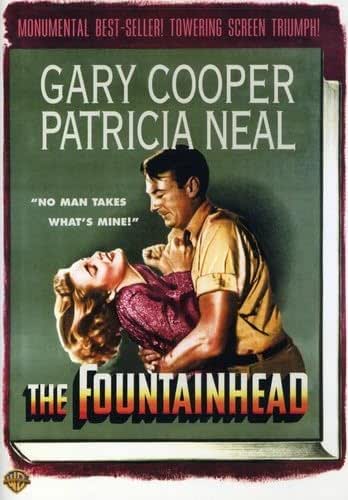**½/**** Image A Sound A Extras D
starring Gary Cooper, Patricia Neal, Raymond Massey, Kent Smith
screenplay by Ayn Rand, based on her novel
directed by King Vidor
by Travis Mackenzie Hoover By now, it's tedious to recount the many intellectual sins of Ayn Rand. Anyone with the intelligence to put two and two together knows that her "radical individualism" is mere solipsism with a pretty face, but this of course has not stopped teenagers of all ages from thrilling to her Freudian, sexed-up literature, which preaches the "virtue of selfishness," i.e., whatever the audience decides is in its best interest. Still, one has to attest to the compelling nature of her screwball oeuvre, and the film version of her The Fountainhead pretty much sums up why she's so hilariously entertaining. The problem isn't that she's not acquainted with reason, but that she's not acquainted with human behaviour; her script is so outrageously presumptive of how the mediocre and the mob-driven think that it's impossible to keep from laughing long and heartily.
That rugged individualist Gary Cooper is inevitably assigned to the role of Howard Roark, the ultra-Modernist architect who insists on his way or no way; resentful of his greatness, almost everybody else conspires against him. They hate him in school, they hate him in the world of architecture, and the one firm that shows faith in him winds up going broke on the gamble. He's enough of a threat (regardless of the fact that nobody wants to take notice of him) that once he finally lands a gig designing some luxury apartments, he's attacked by THE NEW YORK BANNER, "the newspaper of the people" run by thoroughly evil Gail Wynand (Raymond Massey). Roark does have a champion in Dominique Francon (Patricia Neal), however, the second-string BANNER columnist who worships at his shrine–they even have an encounter (that is to say, rape) while he's slumming as a quarryman near her wealthy parents' home. But at the same time, she feels threatened by him, and runs to the arms of hateful Gail for reasons only Rand can know for sure.
There's a lot of bizarre self-abnegating behaviour in The Fountainhead. Rand refuses to accept the idea that people don't like avant-garde work because they don't understand it or just don't like it–no, it threatens them and their place in blah, blah, blah. I casually know enough "mediocre" film critics to understand that they're not hateful connivers; indeed, they're mostly blissfully ignorant of what they might be missing. But the idea of being ignored is completely unthinkable in the Rand universe. There has to be a conspiracy against the genius–and, in effect, against those radical individuals who think for themselves and without any sort of purpose. This, naturally, has great appeal to teenagers going through the motions of defining their identity, but it simply doesn't line up with reality.
Now, just because you're ridiculous doesn't mean you're unwatchable. The Fountainhead is directed by that most credulous of auteurs, King Vidor, who places such faith in the material that it fairly explodes with outrageousness. Much has been made of the phallocentricism of the piece–it's all skyscrapers and drills in slate quarries, the latter of which is the ideal occasion for confused Dominique to lose it to manly Howard. But for the most part it's the straight-up translation of Rand's dialogue and situations that pops, the rather non-melodramatic rendering of insane melodrama that is a pretty accurate representation of Rand as both writer and thinker. She's all about seeming a rock in a river of contempt when she's actually as calm and collected as Fay Wray in the grip of Kong.
In fact, The Fountainhead would get a full three stars for camp were it not for some of the nastier consequences of the woman's thought. Rand's individualism often turns into sadism–the imposition of one will on a large number of people and thus their subjugation. This bullyboy aspect makes the later passages of the film a bit unpleasant while revealing the author's fascist underpinnings. When Roark spits on the idea of designing public housing for the sake of its disadvantaged residents, he transforms what was ludicrous adolescent fantasizing into something genuinely hateful–sort of like Rand opposing desegregation on the grounds that it violated property rights. No amount of camp can compensate for the disgust Rand had for other people, something that casts a pall the proceedings never completely shake.
THE DVD
Warner's DVD release of The Fountainhead once again demonstrates the studio's commitment to its back catalogue. The full-frame image is crisp and free of defect, with excellent shadow detail during its darker scenes and a sharp rendering of the many architectural drawings. The Dolby 1.0 mono audio is equally fine, boasting a full round sound that does not compromise clarity. Extras include a retrospective featurette, "The Making of The Fountainhead" (19 mins.), that was no doubt made by Rand acolytes: not only do they roll over for all of her main ideas (her novel is possessed of a "piercing intellect"), but they also manage to fumble an account of the production–which, aside from Cooper and Neal's scandalous romance, apparently went off without a hitch. It's one of the laziest makings-of I've ever seen and should serve as a warning of the wages of sycophancy. Also included: the film's theatrical trailer.
112 minutes; PG; 2.35:1 (16×9-enhanced); English DD 1.0, French DD 1.0; CC; English, French, Spanish subtitles; DVD-9; Region One; Warner




